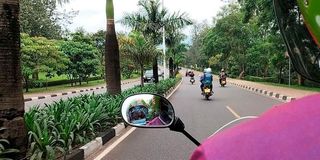Rwanda enjoys smooth ride on two-wheelers

Passengers on a taxi-motos in Rwanda’s capital, Kigali.
What you need to know:
- And so as a visitor, it is not surprising to note one constant, almost like a pattern, that all Rwandese motorcycle operators wear helmets and have another for their passengers.
By Hellen Shikanda
The steep and hilly Rwandan terrain would make anyone with the fear of being on a motorcycle opt to walk or use an alternative means of transport.
The winding, though neatly tarmacked, roads of Kigali, Rwanda’s capital, make it even more dreadful for people suffering motorcyclophobia. A voice in their head possibly gives them an illusion of an impending accident or an injury anytime they think of hiking on a motorcycle.
With hindsight, therefore, one is tempted to believe that Rwandese authorities had such people’s interests at heart when they came up with regulations for the sector, commonly known as taxi-moto or simply moto in Rwanda, and boda boda in other parts of East Africa. Undoubtedly, in Rwanda, one thing stands out—the safety of all passengers must be guaranteed.
And so as a visitor, it is not surprising to note one constant, almost like a pattern, that all Rwandese motorcycle operators wear helmets and have another for their passengers. While you may be quick to adapt to helmet-wearing as a visitor, you are likely to miss a piece of cloth that is a must have just before donning the helmet.
“We can’t allow a passenger to use our helmet without a piece of cloth beneath the helmet. This is a rule that came about when the pandemic struck. It helps in reducing the spread of Covid-19,” a motorcycle operator tells Healthy Nation.
Riders’ accounts
Healthy Nation finds Eric Hitimana and his colleague Jean-Pierre just after they have dropped off passengers at the University Teaching Hospital of Kigali (Centre Hospitalier Universitaire De Kigali), abbreviated as CHUK. It is the largest and oldest referral hospital in the city. A fleet of motorcyclists is outside the gate, where people are either dropped off by personal vehicles, taxis or motorcycles; rarely the public service vehicles. Motorbikes are the most preferred means of transport here.
Jean-Pierre has been a rider for 10 years. In a decade, he has had an accident just once, which made him lose eight months of his life.
“I remember I had a male passenger whom I had picked from the supermarket and we were headed for his home. I was still in the town’s vicinity and I remember following all the traffic rules to the letter. A car that was in front of me stopped so suddenly I had no time to swerve and move to a safer place,” he narrates.
“I don’t remember what happened next, but I was taken to hospital... I had an injury in my leg; a bone fracture that made me stay in hospital for almost a year, eight months, to be precise.”
Hitimana, on the other hand, has been an operator for five years only. He has been fortunate enough never to have had a serious injury in relation to his job.
“I am lucky. I have only had a minor accident, which disfigured my tooth. It was just a slight miscalculation that cost me my tooth. That aside, my rides have all been safe,” he tells Healthy Nation.
Innocent Marie, named changed because of patient confidentiality, got into an accident three weeks ago. She was admitted to a city hospital and doctors said she had internal bleeding. Save for the wounds that showed signs of drying up when Healthy Nation visited, her recovery is nigh. Marie does not remember how the accident occurred but she acknowledges that her rider was speeding.
“I remember warning him a couple of times. We escaped accidents a number of times until it finally happened. It was like déjà vu, which happened, anyway. We are lucky to have helmets; otherwise, I would have been badly injured or even dead,” she says.
“My legs hurt, my hands, too, but I know I will be back on my feet soon.”
Surveillance
In 2020, Rwandese authorities installed over 500 speed cameras across the country. They are wide pole-like erections painted black and grey. The locals have since christened the cameras Sophia. As a visitor, you may dismiss it as a sophisticated traffic light.
“We call it Sophia because the cameras were introduced in the same year that a humanoid robot called Sophia was brought to the country. It behaves like a human being. A typical snitch,” explains Venant, a taxi driver in Kigali.
“You see, when Sophia notices that you are speeding, it instantly takes note of your details by taking a photo, sends you a fine receipt and notifies you of an ultimatum of when to pay. You cannot run away from Sophia. It works just like the police, a stricter one, I must say.”
As you drive south to the villages in Rwanda, way past Nyanza District towards Huye District, there are trapezoidal mobile speed cameras placed by the police at accident black spots.
Deterrent charges
Speeding is punitive and the charges are harsh. If an offender pays instantly, it costs them about 25,000 Rwandan Francs (about Sh2,800). If one delays payment, say beyond two days, the amount shoots up to 35,000 Rwandan Franc (about Sh3,900).
Aime*, a University of Rwanda student who owns a moto, was on Sophia’s radar and had to pay.
“I was rushing to submit an assignment that was due... I passed by three Sophias and all of them captured my details and sent a receipt to my phone. I had three days to pay 75,000 Rwandan Francs (about Sh8,500). That was money I had not budgeted for, but breaking the law has its repercussions, you know.”
Besides, the Rwandan government introduced red light cameras (RLCs) last December. An RLC is an automated system that spots and takes images of vehicles and motorcycles that violate traffic signals even when the police are not around.
Motorcyclists are still learning to work with it and all those in Kigali have a metered system installed on their phones to allow streamlined cashless payment for violations, using an online tariff called MoMo. Further, they don’t speak on the phone while riding. They have to park off the road first.
In June last year, there was an uproar by Rwandese on Twitter after someone shared a photo of a woman carrying her baby on the back while on a taxi-moto, risking the baby’s health.
“One passenger per rider has no exemption, not even children can ride on the same taxi-moto with their mother. It has to be a really special case like a sick child. Still, you have to notify the police because you will be arrested if you don’t,” Hitimana, a rider, tells Healthy Nation.
Cooperatives
Most motorcycle operators are members of cooperatives.
Dr Jean Bosco Harelimana, the head of Rwanda Cooperative Agency, tells Healthy Nation that joining a cooperative for taxi-motos is voluntary and is not coerced.
“There are professional required permits for driving and then having a moto (the motorcycle). One also has to write a motivation letter and if successful, you are invited in person to see if you have the same vision as theirs,” says Dr Harelimana.
More than 46,000 taxi-moto riders are attached to the 181 cooperatives in the country. In Kigali, about 25,000 taxi-moto riders are part of a cooperative.
However, some riders who spoke to Healthy Nation were indifferent to how the cooperatives surcharge them for insurance.
“It is managed internally within their cooperatives. The reason they have cooperatives is to work together and negotiate their premiums. When you negotiate alone, you are likely to have a higher price,” explains Dr Harelimana.
The insurance uproar is due to the claims made in the event of an accident. Insurance companies reported that the claims had increased. The matter escalated to parliament.
Media reports show that 70 per cent of accident claims in Rwanda are caused by motorcycle accidents. This made insurers increase their premiums, which most riders could not afford.
“I think the insurers and the cooperatives are greedy by overcharging us. The insurance pays for accidents only when it is not the rider’s fault,” one rider tells Healthy Nation.
The latest statistics available on motorcycle accident casualties were released in 2017 before the regulations came into effect. At the time, the Rwanda National Police reported over 200 accidents, of which Kigali accounted for 176.
CHUK could not immediately share data on moto accidents, but a doctor, who did not wish to be quoted, said there were not many casualties in the emergency ward when we visited.
Reporting by Jane Njoroge, Ange Iliza, Hellen Shikanda, Elizabeth Merab, Jurgen Nambeka, Herieth Makwetta, Pauline Ongaji, Mary Wangari and James Kahongeh




